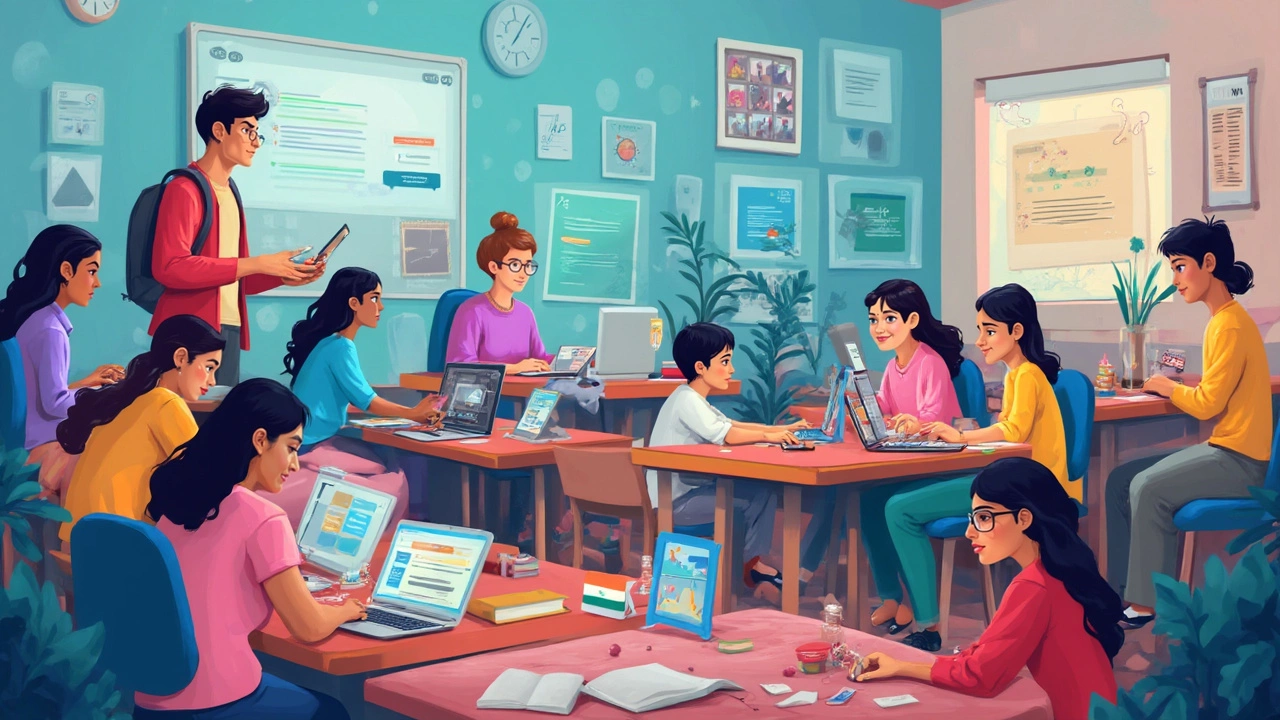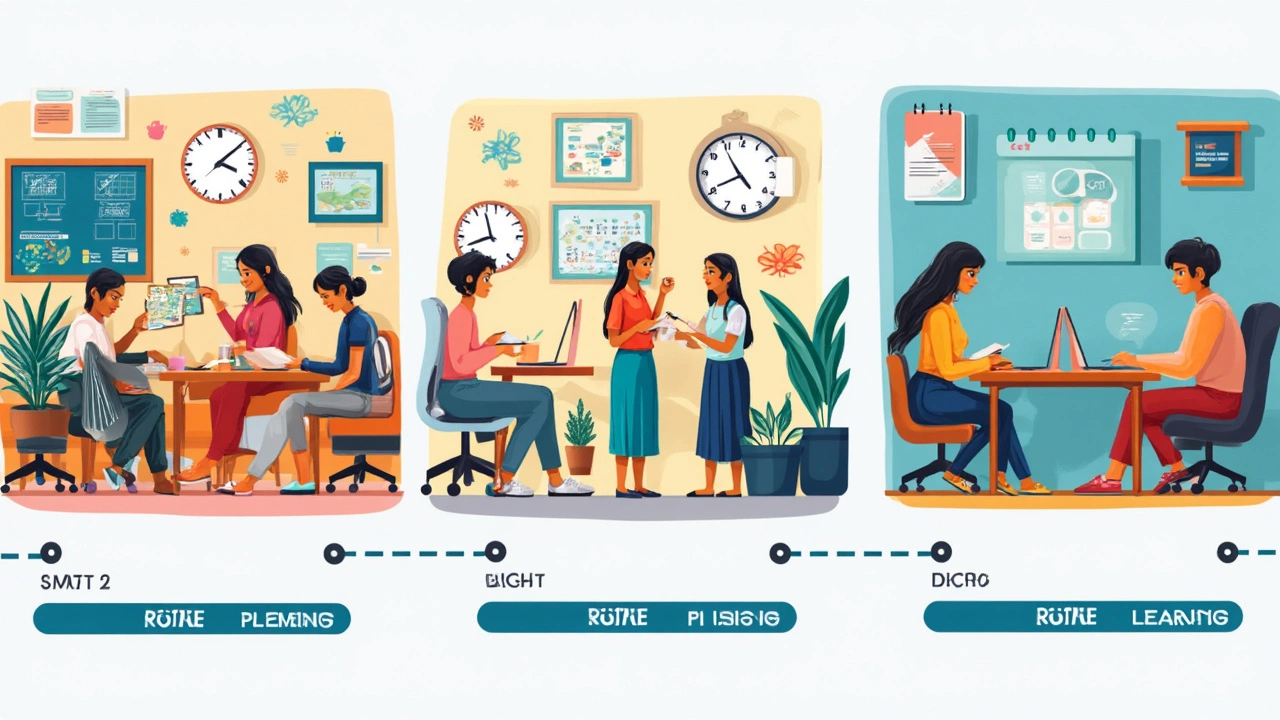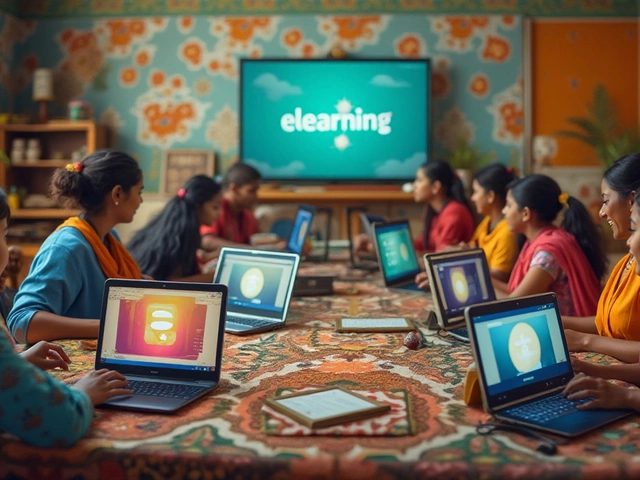
Want to learn code but worried it’ll take forever? The truth is, the length of coding school totally depends on what you pick. Some folks finish up in just 8 weeks, while others go at it for two years or more. You’ve got choices, and each comes with its own timeline, so knowing what to expect helps you skip the guesswork—and maybe save time and money.
Most people look at three main paths: rapid-fire bootcamps, traditional college degrees, or flexible online options. Each has its fans, and the speed varies a lot. One big surprise? The fastest doesn’t always mean the best, especially if real-life coding jobs are your goal. Let’s untangle what really goes into picking the right length for your situation, and what’s hype versus reality.
- What Determines the Length of Coding School?
- Bootcamps: Fast Track or Too Fast?
- College Degrees vs Other Paths
- Part-Time, Full-Time, and Self-Paced Options
- How to Choose the Right Timeline for You
What Determines the Length of Coding School?
No two students have the same path into coding, and that means the time you’ll spend in a coding school can be very different from someone else. Let’s get straight to the real factors that actually make a difference.
- Type of Program: Bootcamps, college degrees, and online courses all have different setups. For example, most coding bootcamps run about 12 to 16 weeks full-time, while an associate degree usually takes two years, and a bachelor’s degree means four years. Self-paced online options can go as fast—or as slow—as you want.
- Learning Style and Pace: Some folks fly through material and master skills quickly, while others need more time. Coding requires practice, not just listening to lectures.
- Part-Time vs Full-Time: Picking part-time lets you keep your job, but you’ll be learning for a few more months. Full-time means longer daily hours, but you’re done faster.
- Curriculum Depth: Courses covering just the basics take less time than ones that go deep into software engineering or data science. The more you learn, the longer you’ll spend.
- Your Background: Already know a bit of coding? Great, you might zip through faster than true beginners.
Here’s a quick look at how long different program types really take for the average student:
| Program Type | Typical Duration |
|---|---|
| Full-time bootcamp | 12–16 weeks |
| Part-time bootcamp | 20–36 weeks |
| Associate degree (college) | 2 years |
| Bachelor’s degree (college) | 4 years |
| Online/self-paced course | 1 month–1 year |
The most important thing? There’s no universal answer. The keyword here is how long is coding school—and it literally depends on your choice, your pace, and your life situation. Knowing what shapes that timeline can save you time and headaches later on.
Bootcamps: Fast Track or Too Fast?
Coding bootcamps took off because people loved the idea of learning to code in months—not years. You’ll see most bootcamps advertise lengths of 8 to 24 weeks full-time. That means six to twelve hours a day, five days a week, and lots of late-night bug fixing. If you’re aiming for the fastest coding bootcamp length, this is it. Expect a rush, not a stroll.
Quick fact: The Council on Integrity in Results Reporting (CIRR) found the average U.S. bootcamp runs about 14 weeks. That’s around three months from start to finish, compared to a two-year associate’s degree or four-year bachelor’s. But it’s not all about speed—these programs keep the gas pedal down, so you need to keep up. You’ll hit all the basics—JavaScript, HTML, CSS, maybe some backend frameworks—and finish with a project.
“Coding bootcamps can open doors into the tech industry faster than any traditional path, but they demand serious commitment every single day.” — Liz Eggleston, co-founder of Course Report
Bootcamps work well for people who like structured, hands-on learning and don’t want to wait years for their first tech job. But here’s the kicker: fast doesn’t mean easy. Students often mention long, stressful days and a lot of mental fatigue. You’ll need some grit to show up every day and keep grinding.
- Full-time bootcamps: 8–16 weeks, Monday to Friday, 40+ hours per week
- Part-time bootcamps: 20–36 weeks, evenings and weekends (usually for folks working day jobs)
What about results? Course Report’s 2024 survey reported that 79% of bootcamp grads landed jobs in tech within six months. Most big bootcamps like General Assembly or Flatiron School are upfront with hiring stats and even offer career coaching, interview training, and job guarantees.
| Bootcamp | Typical Duration | Job Placement Rate |
|---|---|---|
| General Assembly | 12 weeks (full-time) | 86% within 6 months |
| Flatiron School | 15 weeks (full-time) | 84% within 6 months |
| Hack Reactor | 12 weeks (full-time) | 79% within 6 months |
The downside? You don’t get much breathing room. If you fall behind, there’s no catching up unless you put in extra hours after class. If your life is already super busy, part-time options make more sense, but they take longer—sometimes up to nine months. You trade speed for flexibility.
So is bootcamp the ‘fast track’? Totally. But too fast for some? Yep. Make sure your schedule, your support system, and your energy levels can handle it before you dive in. It’s an intense sprint, not a jog, and you only get out what you put in.

College Degrees vs Other Paths
Thinking of college for coding? That’s the classic route. A typical computer science degree takes about four years if you go full-time. Some students finish faster with summer classes or heavier workloads, but four years is the standard expectation. These degrees don’t just cover coding, though. You get math, theory, systems, and even courses like “Intro to Ethics.” The good side? You’ll understand a lot more about how computers work on the inside, and that can open doors in some bigger tech companies.
But the college path isn’t your only option anymore. Coding bootcamps have shaken things up big time. These are usually just 3 to 6 months long—or even shorter, with ultra-fast programs. They jump right into practical stuff: web development, data science, or whatever’s trending in the tech world. You spend most of your time building projects and less time on theory.
There’s also self-paced online courses. Places like Codecademy, freeCodeCamp, or Udemy let you move as quickly or slowly as you want. Some people power through enough material to land junior developer jobs in six months, especially if they treat it like a full-time gig. Most folks juggle jobs or family, so they might take a year or more.
So which path is better? College gives you a broad education and a strong network, but it takes longer and costs way more. Coding bootcamps can get you ready for job interviews faster, but expect an intense pace and less depth. Self-taught? Cheapest option, super flexible, but it takes grit and discipline.
- If you want a deep background and maybe a shot at top tech firms, college is worth the time.
- If you need a quick pivot into tech, a bootcamp will probably get you in the door faster.
- If you’re self-motivated and want to keep costs down, self-paced online learning works.
The most important thing is picking the timeline and experience that fits your life—and your goals for learning to code.
Part-Time, Full-Time, and Self-Paced Options
The way you schedule your studies makes a big difference in coding bootcamp length and how fast you get job-ready. Let’s break down what you can expect with each type—full-time, part-time, and self-paced.
Full-time bootcamps are like diving in headfirst. You’re looking at class every weekday, usually from 9 to 5, sometimes even more. These programs squeeze a lot into a short window—standard lengths are 12 to 16 weeks. That’s about three to four months of coding bootcamp, and you walk out with plenty of projects under your belt. This works best if you can push pause on everything else—like a job or major family responsibilities—to focus totally on code.
Part-time bootcamps let you mix coding with regular life. Classes usually happen in the evenings or on weekends. Most part-time options stretch from 20 to 36 weeks, so about 5 to 9 months. This style’s good if you have to keep your current job or handle family stuff, but you’ll need to stay organized because juggling things gets real.
Then you’ve got self-paced courses. These give you ultimate flexibility—work fast or slow, your call. Some online programs, like freeCodeCamp or Udacity’s Nanodegree, offer rough time estimates (like 5-12 months), but you set the pace. Some people blast through in a few months if they have lots of time, while others go at it for a year or more. This path needs serious motivation—you won’t have classmates or teachers pushing you to finish.
Check out how these main options stack up:
| Option | Typical Duration | Schedule | Best For |
|---|---|---|---|
| Full-Time | 12-16 weeks | Weekdays, business hours | People ready to focus only on coding |
| Part-Time | 20-36 weeks | Evenings/weekends | Folks with work or family duties |
| Self-Paced | 5-18 months | Anytime, flexible | Self-motivated learners |
One quick tip: Always check if a course offers support or a community, especially if you pick the self-paced road. It’s way easier to finish (and actually enjoy it) if you have people rooting for you. And even though timelines look clear on paper, real life sometimes messes with plans—be honest with yourself about what fits. Flexibility matters as much as the schedule.

How to Choose the Right Timeline for You
Picking the length of your coding school isn’t just about speed. You need to match your timeline to your goals, learning style, and day-to-day life. For example, if you want to get job-ready fast, bootcamps that last 12 to 24 weeks could do the trick—they’re built for quick, practical learning and lots of them even guarantee some job support after you’re done. On the flip side, if you need to work or take care of family, going part-time is a solid option. Most part-time coding classes last 20 to 52 weeks, but you get the flexibility to pace yourself without burning out.
For some folks, a traditional college degree feels safer, especially if you’re looking for roles at big tech companies or want a well-rounded education. Four-year computer science degrees can be intense, but they dig deeper into theory and math, which helps if you’re aiming for jobs that need more than just code. But a college path costs more time and money—think about $40,000 to $80,000 and several years of your life.
If you’re a self-starter, online platforms let you set your own pace. Sites like freeCodeCamp and Codecademy can give you skills in months or even weeks, depending on how much time you put in every day. Some learners land a junior dev job after around 1,000 hours of practice, so breaking that up means 3-6 months if you hustle, or longer if you go slow. Flexibility is the biggest upside, but there’s less structure and support, so you have to keep yourself motivated.
When choosing, clue in to what matters most to you. Here’s a short checklist to help narrow it down:
- How long is coding school at each place you’re considering? Write down the real numbers—from graduation rates or school websites.
- What’s your schedule look like? If you can’t do full-time, scratch those fast bootcamps off the list.
- What’s your budget and what’s the cost per week or month?
- Do you need job support at the end? Some schools promise interviews or direct connections to employers in their timeline.
- How much do you already know? Beginners take longer. If you’ve tried coding basics, you could jump to advanced courses and finish faster.
The perfect timeline isn’t about rushing or dragging things out. It’s about making real progress and actually enjoying what you’re learning. Match your target to your life, not just what sounds fast or “guaranteed.” That way, you’ll get skills you can actually use—on your own terms.





